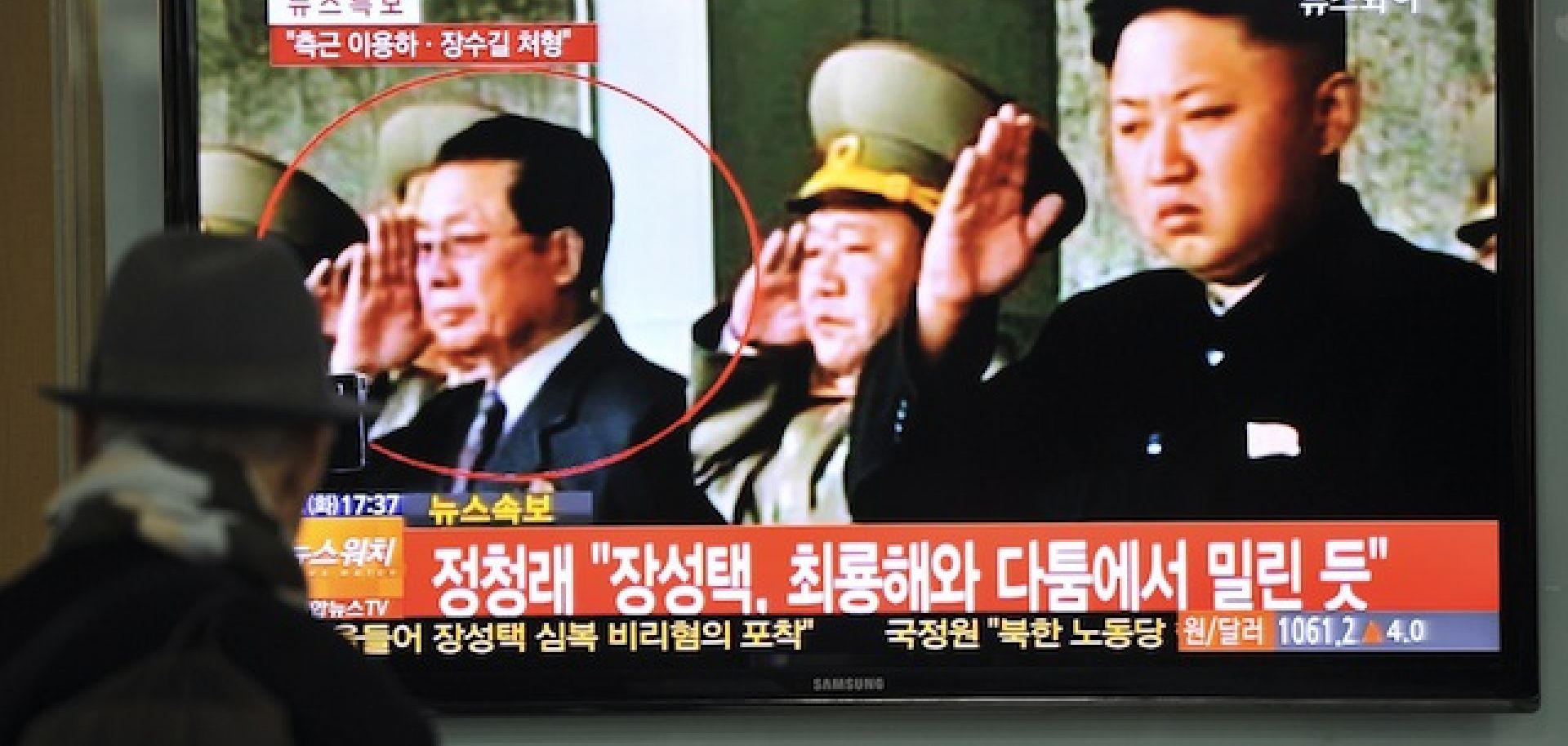ASSESSMENTS
The Policy Impact of North Korea's Latest Purge and Execution
Dec 12, 2013 | 17:28 GMT

(JUNG YEON-JE/AFP/Getty Images)
Summary
Analysis Update: Shortly after the North Korean government confirmed Jang Song Thaek's execution Dec. 12 for crimes against the state, South Korean media reported that two deputy prime ministers were rumored to have fled to China. The rapid purge and subsequent execution suggests the regime feared there was a slow coup forming in North Korea. However, this did not necessarily entail a rapid military move.
Jang worked with the Chinese even before Kim Jong Il's death to solidify his own power and effectively be China's regent for running North Korea. He was also in charge of keeping Kim Jong Il's successor, Kim Jong Un, in line. Jang's power and influence were relatively substantial, but it came with a high cost. There are many among North Korea's elite families and interest groups who have seen themselves and their power eroded by Jang and his allies. So most likely, there was a strong internal struggle among these groups to get Kim Jong Un's ear.
However, Jang's ties to China may have been at once his biggest strength and his biggest weakness. North Korea depends on China for its survival, but it does not want to be completely subservient. Jang's execution will serve as a clear directive to purge those from the government who have allied themselves more closely with China than they have with the interests of the state or the ruling elite. However, Pyongyang is unlikely to renounce all ties to China.
During the three or so years it took Kim Jong Il to fully assert his authority, there were several purges, defections and reports of public executions. In the course of a North Korean transition, the elite maneuver feverishly to position themselves in the new configuration of power.
It is a dangerous time to be an elite in North Korea right now, just as it was in the mid-1990s. During that time, Kim Jong Il essentially sealed off North Korea from the rest of the world. Kim Jong Un has tried a different tactic, but the underlying struggle is similar. In his efforts at "opening up" North Korea, some individuals and factions will be cut out of everything. Others will gain tremendously. Many second-generation leaders in particular will lose the most, while those of the third generation — Kim Jong Un and a handful of rising figures in their 30s and 40s — will probably gain the most. Thus, there is also likely a generational struggle underway in addition to the struggle among families, clans and various interest groups.
It would not be a surprise if Kim Jong Un launched another missile or generated some other kind of agitation in the near future. An episode like this would undermine the Chinese, emphasize that Kim Jong Un is in charge and could force some internal unity. For its part, China is nervous about the situation in North Korea; Beijing depended on Jang as their point of contact. Chinese security forces have reportedly bolstered their presence near the North Korean border. But China will abide the purge so long as North Korea is stable.
In the aftermath of Jang Song Thaek's ouster, North Korea faces a period of heightened uncertainty, though the major trends in national policy are well underway and are unlikely to be reversed solely as a result of this development. Japanese Defense Minister Itsunori Onodera warned Dec. 12 that North Korea's latest purge may mark an extended period of instability, comparing it to China's Cultural Revolution. His comments came days after South Korean President Park Geun Hye warned that inter-Korean relations could become less stable as a result of the North's "reign of terror." Meanwhile, China has refrained from such characterizations, with officials calling it an "internal affair" and editorials in state media suggesting the country likely remains stable. Global media have been rife with speculation over the downfall of Jang, uncle of supreme leader Kim Jong Un (through Kim's influential aunt Kim Kyong Hui). As a chief overseer of the succession process from Kim Jong Il to Kim Jong Un, Jang had a reputation as the second-most powerful figure in the North, but on Dec. 8 the Workers' Party of Korea Political Bureau formally denounced him for factional activities and moral corruption and stripped him of his titles as chief of the Party's administrative department and vice chairman of the National Defense Commission.
Jang wielded extensive influence, so the coming months will be a sensitive time in the North. Though the purge has not yet run its course, Jang's ouster suggests that Kim has taken a major step in consolidating his power as the supreme leader. Relations with other states could become tenser as Pyongyang focuses inward and tries to appear threatening to prevent others from sensing an opportunity to take advantage of internal weakness.
Subscribe Now
SubscribeAlready have an account?
